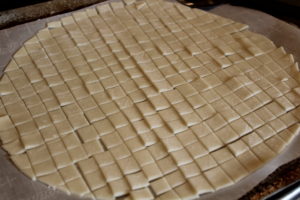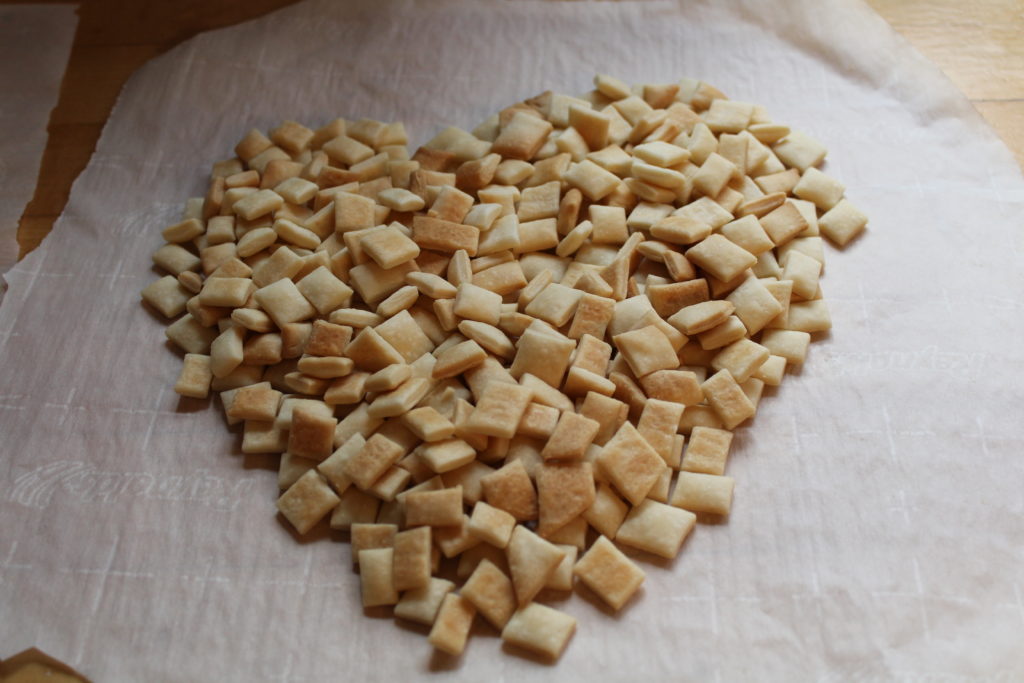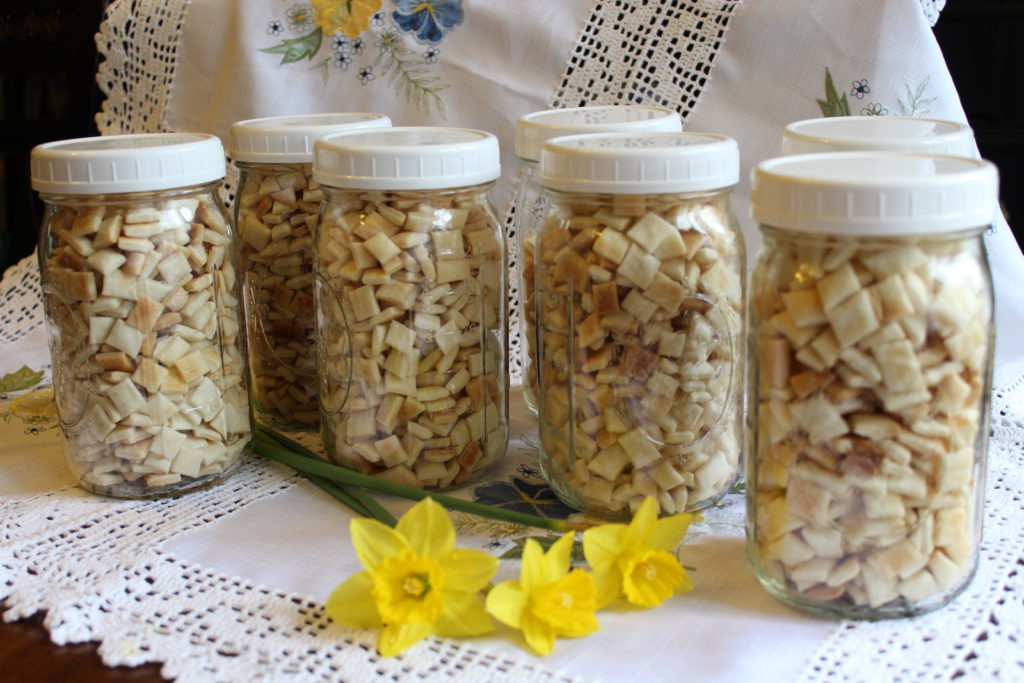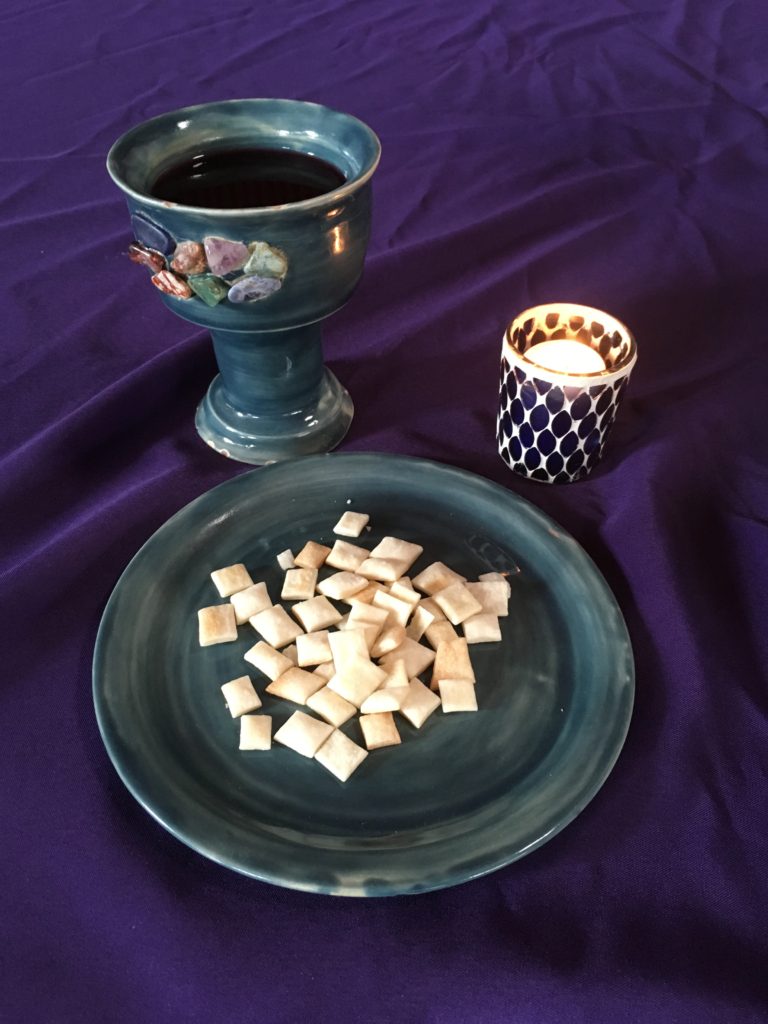It all started a few years ago. I was in church holding a tiny plastic cup filled with grape juice, and an even tinier piece of....something that was passing as communion bread. Our congregation jokingly referred to it as "fish food" because it was so small, dry, and basically a hard pellet made of flour. I turned the bread pellet over in my hand thinking to myself that this was meant to represent the broken body of my beautiful Savior who was so perfect, so loving, so desirable. But the physical reality of that pellet bore no resemblance to anything I desired. I felt sad that many of us congregants joked about how bad the bread was when it was something that was part of the most sacred part of our worship service.
I felt a tug at my heart. I wondered if God might have something in mind for me to do to make our worship experience better. In my mother's church, one of the members made their communion bread, so maybe I could, too. And their communion bread was so delicious. I asked Mom if she would get the recipe for me. Turns out, it was pie crust. Not only was it pie crust, it was made from store-bought dough, rather than homemade! The possibility of me being able to pull this off was increasing!

I talked with our ministers about making communion bread, and they encouraged me to pursue it. Sample batches passed the "yum" test, and so on an Easter Sunday, the bread I had made was served to a larger-than-normal number of worshippers, including several children who had been baptized that morning and were taking their first communion. People noticed the improvement in the bread right away, and really seemed to like it. My mission to have communion bread that was delicious and helped us celebrate the Lord's Supper was accomplished.
But God wasn't finished with me in this. Throughout the years of making communion bread, I have found it to be one of the most creative and worshipful things I have ever done. The process of making the bread is fairly simple, and I've learned some tips along the way that I'm happy to share with you in detail. The simplicity of the process opens up this opportunity to worship to just about everyone who wants to do it. Here are some ways that making communion bread has brought me closer to God.

1) I can happily serve God behind the scenes. (Get humble, sister.)
I'm the church organist. Everyone knows I'm there. You can't miss a loud, rolling organ!! Like all church musicians, I put myself out there week after week. Doing something "behind the scenes" that often goes unnoticed week after week allows me to relax into a different kind of ministry and service that is crucial to God's work. I have found that when I know I'm doing God's will, it never feels like a chore or inconvenience. There is true love and joy in doing the task for my Lord.
2) Nothing God asks me to do is trivial. (God--not the Devil--is in the details.)
I've come to realize that we all have parts to fulfill in building the Kingdom of God here on earth. We may have many things that God asks us to do, and each one is important. Details are important to God, especially in our worship, as evidenced by such things as his instructions to Moses and the Israelites for building the tabernacle in the Book of Exodus (see Exodus 25-31).
The Bible does not have instructions for how churches should prepare, serve, or conduct Holy Communion. There are no instructions on frequency, whether it must be weekly, monthly, or quarterly. These are left up to individual denominations and congregations. Even though the exact details about communion are not communicated to us, one thing is clear--Jesus instructs us to break bread and drink the cup in His memory until he comes again. And he [Jesus] took bread, and when he had given thanks, he broke it and gave it to them [the 12 disciples], saying, "This is my body, which is given for you. Do this in remembrance of me." And likewise the cup after they had eaten saying, "This cup that is poured out for you is the new covenant in my blood." Luke 22:19-20

3) I come to know more about the nature of God through the gifts he gives me. (God never gives gift cards.)
David wrote in Psalm 34:8, "Taste and see that the Lord is good." God has given us senses and the ability to experience the world around us so that we can come to know Him better. When I taste something yummy, it is because of the goodness of God. All good things come from Him, as testified by James when he wrote, "Every good and perfect gift is from above, coming down from the Father of the heavenly lights, who does not change like shifting shadows" (1:17). When we experience a good gift--like good food--we experience God and his goodness.
4) God transforms the ordinary into something holy. (Amazing. Grace.)
I am always amazed by the transforming power of God to make the mundane into something sacred! In the Old Testament, people built altars and presented their offerings of worldly goods--livestock, birds, flour, grain--and the altar became a place of sanctification. The altars in our church are similar. When we present our gifts of money to the Lord, they are placed on the altar and God takes those and does more with them than we could ever imagine. We place the bread and wine on the altar to help us remember that Jesus was sacrificed to make us acceptable to God.
Some faith traditions believe that the bread and wine that are used for communion become the flesh and blood of Jesus. In other traditions, they are symbols. In both instances, however, the bread and wine made of worldly ingredients, become sacred. In other words, something that I made and came out of my little kitchen can be used to glorify God.
This reminds me that I, too, am transformed by the power of God through grace by the death and resurrection of Jesus. This is the foundation of Christianity that Jesus has transformed every sinner into a totally worthy, clean, blameless child of God! As the apostle Paul wrote to the church in Corinth, "So if anyone is in Christ, there is a new creation: everything old has passed away: see, everything has become new!" (2 Corinthians 5:17)

The process of creating something--regardless of its complexity--as well as the end result can be ways to experience God, to worship him, to come to know him better, and to renew ourselves in our faith. Whether you cook, write, craft, paint, sing, play a musical instrument, or create less tangible things such as fellowship, hospitality, health, or well being (to name a few), all of these can be used to bring yourself and others even closer to God.
May the Lord of all Creation bless you this day!
~Shana
1 thought on “Breaking bread”
Leave a Reply
You must be logged in to post a comment.
Thank you, Elaine! I’m so glad to be able to make the bread. I’m pretty sure Effie feels the same way. ~Shana